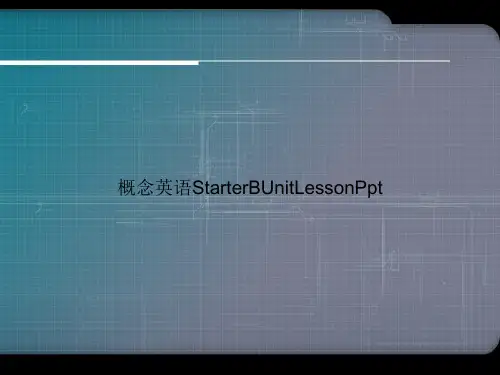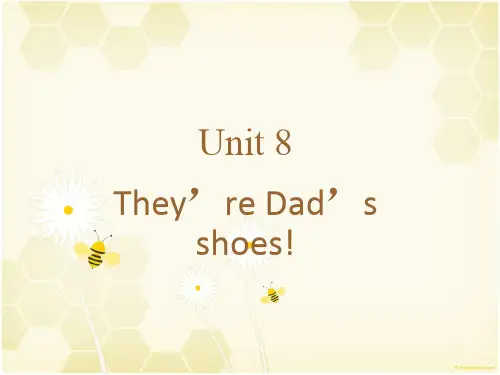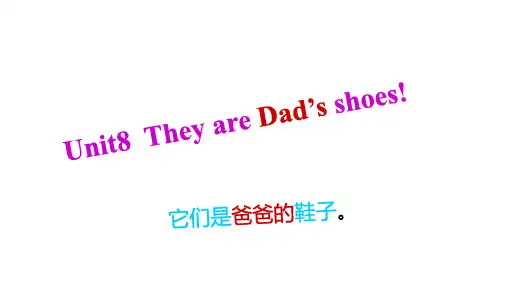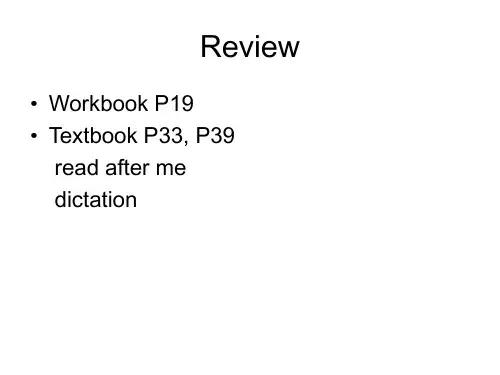新概念starterB-unit8完整课件
- 格式:doc
- 大小:18.50 KB
- 文档页数:3









新概念starter B unit8
一、课堂导入:
女生都是爱漂亮的,你也有很多好看的衣服,但是你知道这些漂亮的衣服用英语怎么说吗?我们今天就一起来学学吧!
新课内容:
一、单词
Dress 连衣裙Jacket 夹克衫Jeans 牛仔裤Shoe 鞋子Skirt 裙子Sock 袜子
Trousers 长裤
Coat 外套
Scarf 围巾
Touch 碰触
Dragon 龙
Drum 鼓
Tree 树
Truck 火车
Dream 梦;梦想
二、句型
1.特殊疑问句
以特殊疑问词开头,对句中某一成分提问的句子叫特殊疑问句。
常用的疑问词有:what 、who 、whose 、which 、when 、where 、how 、why等。
特殊疑问句有两种语序:
1.如疑问词作主语或主语的定语,即对主语或主语的定语提问,其语序是陈述句的语序。
例:Who is singing in the room?
Whose bike is broken?
2.如疑问词作其他成分,即对其他成分提问,其语序是:特殊疑问词+一般疑问句【特殊疑问词+be/助动词/情态动词+主语+谓语】
例:What does she like?
What class are you in﹖
Where are you from﹖
What time does he get up every morning﹖
How do you know﹖
注意:
回答特殊疑问句时,不能用yes / no,即问什么答什么,尤其是简略回答。
如:
Who is from Canada﹖
Helen (is).
Where's the restaurant﹖
Near the station.
Why do you like koalas﹖
Because they are cute.
常用的特殊疑问词:
Who谁——Whose谁的(加se)
Why为什么 When什么时候 Where在哪里 Which哪一个
What什么 ( What time什么时间 What colour什么颜色)
How怎么样(How many多少{数量} How much多少钱{价格},多少(对不可数名词进
行提问)
How long多长 How often多少次 How big多大 How heavy多重{重量} How far多远{路程}
三、语法
名词复数规则
1.一般情况下,直接加-s,如:book-books, bag-bags, cat-cats, bed-beds
2.以s. x. sh. ch结尾,加-es,如:bus-buses, box-boxes, brush-brushes, watch-watches 3.以“辅音字母+y”结尾,变y为i, 再加-es,如:family-families, strawberry-strawberries
4.以“f或fe”结尾,变f或fe为v, 再加-es,如:knife-knives
5.以“o”结尾,有生命的加-es,如:potato-potatoes,hero-heroes 无生命的加-s,如photo-photos
6.不规则名词复数:
man-men, woman-women, policeman-policemen, policewoman-policewomen, mouse-mice child-children,foot-feet,tooth-teeth,fish-fish,people-people, Chinese-Chinese, Japanese-Japanese
名词单复数同形记忆口诀
以下这些名词单复数同形
fish 鱼,deer 鹿,sheep 绵羊,works(工厂),means 手段,Swiss 瑞士人,Chinese 中国人,
如This is a steel works. 这是一家钢铁厂。
There are many steel works here. 这儿有多家钢铁厂。
只有复数形式的名词
一些名词常以词尾s的复数形式出现,用作复数。
这些名词所表示的是由两个不可缺少的对应的部分组成的一个整体,“都有两条腿”。
它们是:trousers 裤子,pants 裤子,shorts 短裤glasses 眼镜,compasses 圆规,scales 天平,pliers 钳子,clips 剪子
巧记
裤子和眼镜,天平和圆规,S 叮得紧,只因两条腿。
这些名词都可看作复数,
如:Your trousers are put on the bed.
Where are my glasses?
若要表示“一条裤子”、“两副眼镜”,就必须用 a pair of, two pairs of 之类的短语,如: a pair of trousers 一条裤子,two pairs of glasses 两副眼睛
另外,有一些以s结尾的学科名词,如politics(政治)、mathematics(数学)、physics(物理)、phonetics(语音学)以及news(消息)、means(手段)等,通常都当作单数看待。
如:一条消息 a piece of news,数条消息pieces of news “某国人”的复数
“某国人”的复数有三种类型:
(1)Chinese, Japanese, Swiss 三国人单数复数同形,不需加s;
(2)Englishman, Frenchman, Dutchman 复数要把man 变为men;
(3)其他各国人以-an, -ian 收尾的均直接加s。
如:Americans, Australians, Indians 等。
巧记
中国日本和瑞士,复数不需加s;
英国法国荷兰人,要把man 变成men ;-an, -ian 各国人,后边直接加s。